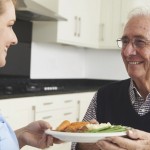Hot on the heels of last month’s report by the Malnutrition Task Force which indicated that over a million older people could be at risk of suffering from malnutrition, a new booklet written by care home chefs and nutrition experts at Care UK could help family and friends who are worried that loved ones living alone might not be getting enough food and drink to maintain good health.
The Malnutrition Task Force research said that the vast majority of the 1.3 million people over 65 at risk of malnutrition live in their own homes. The booklet entitled Eating as we age sets out to help those living in their own home to improve their levels of nutrition and hydration.
Apart from the obvious loss of weight, older people suffering from poor nutrition and hydration are more prone to infections and pressure sores, more likely to have a fall or experience confusion. It is also widely known that people with dementia may, if not properly supported, suffer from malnutrition because they lose track of whether or not they have eaten a meal.
Dementia, the natural aging process and even some medication can also affect people’s taste buds with food that they have previously enjoyed no longer tasting so good leading to many people losing their interest in eating.
The Eating as we age guide provides information on how to overcome common problems associated with diet in older age, such as keeping older people interested in food and encouraging those with a diminished appetite to eat, making every mouthful count with ideas for fortification, and advice on how to create an environment that supports older people to dine with dignity.
One of the authors of the booklet is Jon Bicknell who heads up the food service team at Care UK. Jon said: “Our care home chefs spend a lot of time talking to residents, their families and their carers about food and drink. Over the years we’ve built up an incredible store of knowledge about older people’s nutrition and the techniques that can be used to tempt a jaded appetite. We thought it would good to share that expertise with the families, neighbours and friends of older people who are still living in the community who might be at risk of poor nutrition so the idea of the booklet was born.”
Several Care UK homes are also holding events including talks and tasting sessions for local people to come along and find out more about nutrition in older age.
Copies of the new Eating as we age booklet can be downloaded from www.careuk.com/care-homes/eating-as-we-age.
Eating as we age is the fourth free advice booklet produced by Care UK using their in-house expertise gained by running over a hundred care homes. The other three are:
- As Easy as ABC – guide to activity based Care UK
- Listen, Talk, Connect – to help everyone to communicate with people living with dementia.
- Good to go guide – to help family carers of loved ones living with dementia to get out and about.
Copies of all of these can be downloaded from this page. As well as proving popular with families of those with dementia, they have also been used by people working in hospitals, older people’s clubs, doctors’ surgeries and colleges training people in social care.





